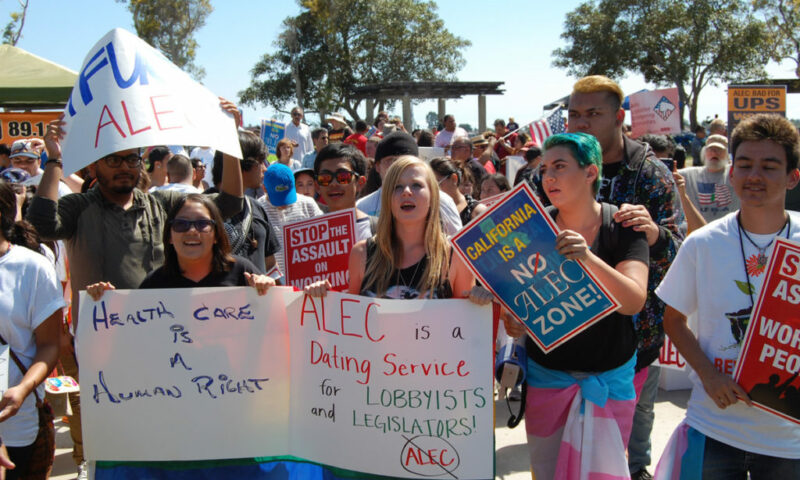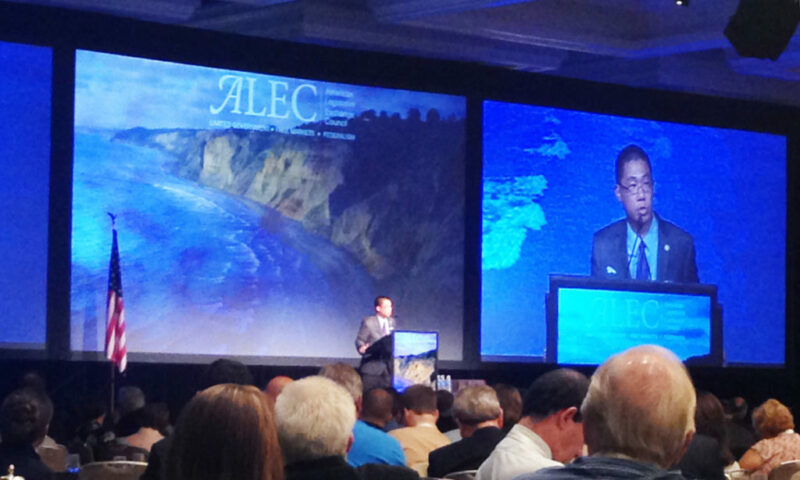

Scott Walker couldn’t have asked for more.
When the Wisconsin governor took the dais Thursday at the American Legislative Exchange Council’s annual conference in San Diego, his audience was ravenous for any vision that included destroying unions and cracking down on America’s criminal underclass.
See more of our coverage of the ALEC Annual Meeting
The venue was the plenary croissants-and-eggs breakfast, but it would be hard to imagine an audience hungrier for the red meat Governor Walker threw out to it.
Every key bill Walker has been associated with, since his get-tough-on-crime heyday as a state assemblyman in the 1990s, has been a plagiarism of an ALEC model bill. Such as laws that eliminated parole (and ballooned state prison populations) or that imposed a voter ID law, gutted public education and teacher protections, and made Wisconsin the 25th right-to-work state.
» Read more about: ALEC Confidential: Scott Walker Talks the Walk »


For several tense hours yesterday San Diego’s plush Manchester Grand Hyatt hotel, located in the city’s Embarcadero district, felt more like Athens’ besieged Parliament than a resort on California’s laid-back shoreline.
Around 2 p.m. the hotel, which is playing host to this year’s annual meeting of the American Legislative Exchange Council (ALEC), sealed off all entrances except its main lobby in what became a virtual lockdown.
See more of our coverage of the ALEC Annual Meeting
For the 1,300 state legislators and corporate lobbyists gathered inside, the perceived security threat turned out to be from those who stand the most to lose from ALEC attacks on workplace rights, minimum wage laws and state health and environmental standards — California workers.
An estimated 2,500 protestors, carrying placards declaring California to be an “ALEC-Free Zone,” gathered around 1 p.m. in Embarcadero Marina Park to hear a series of speakers lambasting the secretive,
» Read more about: Labor Rally Sends ALEC Conference Into Lockdown Mode »


The 42nd Annual Meeting of the American Legislative Exchange Council (ALEC) got underway in earnest Wednesday at San Diego’s Manchester Grand Hyatt resort hotel. The mood was convivial and the attire corporate casual: Brooks Brothers suits without ties, Dockers and sports shirts.
Although this year’s star attractions — a GOP presidential frontrunner, Wisconsin Governor Scott Walker, and a returning presidential contender, former Arkansas Governor Mike Huckabee — weren’t scheduled to speak until Thursday, conference delegates had plenty to do yesterday.
The packed opening luncheon featured Iowa’s virulently anti-immigrant Congressman, Steve King.
ALEC, a secretive rightwing bill mill that gets its funding from the Koch Brothers and global multibillion dollar corporations, has been described as a legislative dating service that arranges hookups between mostly Republican state lawmakers and corporate lobbyists.
See more of our coverage of the ALEC Annual Meeting
The actual “dates” occur at meetings like those unfolding in San Diego — a council spokesperson said 1,300 conferees were in attendance — and take place behind locked doors,
» Read more about: ALEC Confidential: Inside the San Diego Conference »


Texas law enforcement officials may or may not have murdered Sandra Bland in her jail cell earlier this month, three days after her arrest during a routine traffic stop. At a Monday press conference, Waller County District Attorney Elton Mathis – who is charged with investigating Ms. Bland’s death – implicitly blamed the victim: “Sandra Bland was very combative. It was not a model traffic stop. It was not a model person that was stopped.”
We’ve heard this before, especially in response to police killings of African Americans. Michael Brown, killed by Ferguson police, was “no angel.” Freddie Gray, killed in Baltimore, was “no saint.” Former altar boy Patrick Dorismond, killed by the NYPD, was “no altar boy.” Oscar Grant, Trayvon Martin and countless others have been similarly described, as though this is a mitigating – or worse,
» Read more about: Sandra Bland and Toeing the Thin Blue Line »


The line of people standing outside the event in downtown Los Angeles snaked out the door and down to a sidewalk—but there were no velvet ropes and it wasn’t at Nokia Center or L.A. LIVE. The venue was the Kenneth Hahn County Hall of Administration.
The hundreds who waited Tuesday morning in muggy heat had come to weigh in on a measure before the Board of Supervisors to increase the minimum wage in L.A. County’s unincorporated areas.
Perla Lagunas and her kids traveled from North Hills in the San Fernando Valley to show support. “I represent a low-income community,” she said. Her mother was a garment worker who struggled with bills and groceries. “My mom worked with people who wouldn’t pay her a good wage. We grew up so poor– sometimes we didn’t have food. We want to let the community know—wake up!”
Representatives from the National Council of Jewish Women stood in line to enter the hearing.


Steven Luftman did not have much to feel good about last Tuesday as he stood in the TSA line before catching a flight from Sacramento to Los Angeles. After all, he was in the process of being evicted from his Fairfax District rental under the state’s Ellis Act, a law that speculators often use to kick out longterm renters from their homes in order to redevelop a property for higher profits. But then Luftman realized who he was standing behind: Matthew Jacobs, the man responsible for his eviction.
Hours before, the two had squared off during the July 14 meeting of the California Housing Finance Agency (CalHFA) in which Jacobs, an agency chairman who had been facing mounting criticism for his efforts to evict dozens of tenants who live in complexes in Los Angeles’ Beverly Grove and Fairfax neighborhoods, announced he was quitting the agency.
“He was right in front of me —
» Read more about: Demolition Man: Developer Matthew Jacobs Quits Housing Agency »


The town of Coatesville, Pennsylvania, outside of Philadelphia, is a former steel mill town full of struggling residents. With a per capita income of $14,079, Coatesville is situated in wealthy Chester County, but it has struggled amid a declining population and lack of job opportunities. Missoula, Montana, on the other hand, was once a thriving lumber town. Its per capita income of $17,166 means it’s slightly wealthier than Coatesville, and the University of Montana and two hospitals are major employers for the city.
Two thousand, three hundred miles separate Coatesville from Missoula, but the two towns have more in common than you might think. One important similarity? Their ongoing struggles with private, for-profit water companies, like too many cities around the U.S.
Coatesville officials sold the public water utility in 2001, hoping to use the one-time cash infusion to spark an urban renaissance while the privately-run PAWC promised to invest in desperately needed modernization and maintenance.


When Democratic former San Jose mayor Chuck Reed and Republican ex-San Diego councilmember Carl DeMaio finally unveiled the language for a promised attempt at getting a statewide public pension cutting measure to 2016 voters, the expectation was that Reed II would be a reined-in and more realistically-framed version of Reed I – last year’s failed attempt at undermining the public pension system.
That try for the 2014 ballot was aborted after Attorney General Kamala Harris slapped it with a candid, albeit politically untenable summary that frankly described the proposed constitutional amendment as targeting longstanding legal rights—rights that protect the pensions and retirement health care of the 1.64 million Californians enrolled in the state’s public pension systems.
But even veterans of the state’s public-sector retirement wars were unprepared for the sheer scale of what awaited them this time around.
» Read more about: Measure of Deception: CA Initiative Would Gut Retirement Benefits for Millions »


Edward Navales realized a career in large tech firms wasn’t for him, and in 2008 he decided to open his own business. Armed with a University of Texas MBA and guided by a desire to do something meaningful, he decided to start a firm in the health care sector. As he surveyed his options, it seemed like a franchise agreement would be the quickest and surest way to success.
He invested savings, took out a Small Business Administration loan and entered into an agreement with Bright Star Healthcare, a small but fast-growing home health care company. Bright Star promised its franchisees support and flexibility. According to Navales, the reality was something else entirely.
“What I found was inadequate support, unrealistic and predatory minimum sales targets and costly vendor requirements,” Navales said. “I soon learned my fellow franchisees were experiencing the same challenges.” Bright Star, claimed Navales,
» Read more about: Step Back, Big Mac: California Franchisees Score Major Victory »
As rental prices skyrocket in Los Angeles, landlords are increasingly kicking out long-term tenants to clear the way for more affluent residents. Lovell Estell III’s story last May about the bittersweet end of Catherine Green’s 30-year tenancy at the Boulevard Villa apartment complex profiled one such case. When she was a child, Green and her family left Jim Crow Texas for the freedom Los Angeles offered. She became a successful businesswoman and homeowner, but this year, at the age of 90, she received an eviction notice. Forced, along with all her fellow tenants, to leave her Crenshaw Boulevard home, and unable to rent in an increasingly expensive Los Angeles, Green returned to the South.
» Read more about: Video: Skyrocketing Rents Driving Long-Time Residents Out of L.A. »